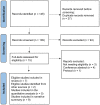Virtual reality rehabilitation following total knee arthroplasty: a systematic review and meta-analysis of randomized controlled trials
- PMID: 35182172
- PMCID: PMC8857886
- DOI: 10.1007/s00167-022-06910-x
Virtual reality rehabilitation following total knee arthroplasty: a systematic review and meta-analysis of randomized controlled trials
Abstract
Purpose: The use of virtual reality (VR) based rehabilitation has increased substantially within orthopedic surgery, particularly in the field of total knee arthroplasty (TKA). The objective of this systematic review and meta-analysis was to compare patient-reported outcomes and cost analyses from randomized controlled trials (RCT) utilizing VR-based rehabilitation in patients following TKA.
Methods: MEDLINE, EMBASE, and Cochrane databases were searched for RCTs involving VR-based rehabilitation following TKA. Quantitative synthesis was conducted for pain scores and functional outcomes. Narrative outcomes were reported for results not amenable to quantitative synthesis.
Results: A total of 9 RCTs with 835 patients were included with follow-up ranging from 10 days to 6 months postoperatively. No differences in pain scores were demonstrated between VR-based and traditional rehabilitation at 2 weeks and 3 months postoperatively. VR-based rehabilitation demonstrated improved functional outcomes at 12 weeks (n = 353) postoperatively [mean difference (MD) - 3.32, 95% confidence interval (CI) - 5.20 to - 1.45, moderate certainty evidence] and 6 months (n = 66) postoperatively [MD - 4.75, 95% CI - 6.69 to - 2.81, low certainty evidence], compared to traditional rehabilitation. One trial demonstrated significant cost savings with the use of VR-based rehabilitation.
Conclusions: VR-based rehabilitation for patients undergoing TKA represents an evolving field that may have advantages over traditional therapy for some patients. The current review is limited by the low quality of evidence in the literature. This is a rapidly evolving field with more trials needed to determine the impact of VR-based rehabilitation on patients undergoing TKA.
Level of evidence: Level I; meta-analysis of randomized controlled trials.
Keywords: Rehabilitation; Telemedicine; Telerehabilitation; Total knee arthroplasty; Virtual reality.
© 2022. The Author(s) under exclusive licence to European Society of Sports Traumatology, Knee Surgery, Arthroscopy (ESSKA).
Conflict of interest statement
MB reports personal fees from Pendopharm, Bioventus and Accumed, outside the submitted work. All other authors (AG, MZ, YC, SP) report no conflicts of interest.
Figures
References
-
- Bettger JP, Green CL, Holmes DN, Chokshi A, Mather RC, III, Hoch BT, de Leon AJ, Aluisio F, Seyler TM, Del Gaizo DJ. Effects of virtual exercise rehabilitation in-home therapy compared with traditional care after total knee arthroplasty: VERITAS, a randomized controlled trial. J Bone Joint Surg Am. 2020;102:101–109. doi: 10.2106/JBJS.19.00695. - DOI - PubMed
-
- Christiansen CL, Bade MJ, Davidson BS, Dayton MR, Stevens-Lapsley JE. Effects of weight-bearing biofeedback training on functional movement patterns following total knee arthroplasty: a randomized controlled trial. J Orthop Sports Phys Ther. 2015;45:647–655. doi: 10.2519/jospt.2015.5593. - DOI - PMC - PubMed
Publication types
MeSH terms
LinkOut - more resources
Full Text Sources
Medical
Research Materials



